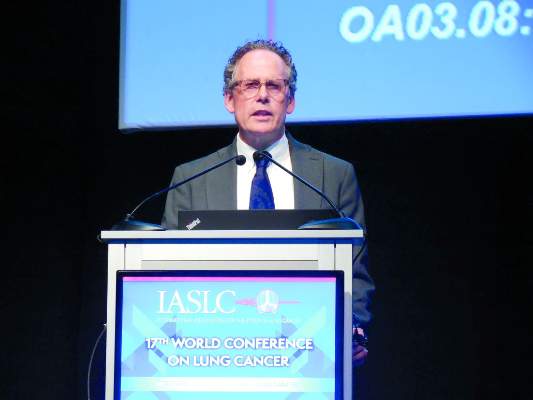AT WCLC 2016
VIENNA (FRONTLINE MEDICAL NEWS) – The oncologic immunotherapy drug nivolumab works by binding PD-1 receptors, but PD-L1 ligand levels in lung cancers do not predict how responsive patients are to the drug.
“While enhanced clinical activity with nivolumab correlates with increasing tumor PD-L1 expression, nivolumab-treated patients with little or no PD-L1 expression have a comparable probability of response, more durable responses, comparable overall survival, and fewer treatment-related adverse events, compared with patients treated with docetaxel,” Solange Peters, MD , said at the World Conference on Lung Cancer, sponsored by the International Association for the Study of Lung Cancer.
As a result, nivolumab (Opdivo) is now the standard of care for second-line treatment of advanced squamous or nonsquamous non–small cell lung cancer (NSCLC) regardless of the tumor’s expression of programmed death–1 ligand (PD-1L), said Dr. Peters, a thoracic oncologist at the University of Lausanne (Switzerland). The 2015 Food and Drug Administration approval cited results from the Open-Label Randomized Phase III Trial of BMS-936558 (Nivolumab) Versus Docetaxel in Previously Treated Metastatic NSCLC ( CheckMate057 ) trial. Those results showed that in unselected patients with advanced or recurrent nonsquamous NSCLC who had stopped responding to a platinum-based chemotherapy regimen, treatment with nivolumab produced significantly better overall survival during follow-up as long as 18 months, compared with a docetaxel-based regimen ( New Engl J Med. 2015 Oct. 22;373[17]:1627-39 ).
But a more detailed assessment of the survival data by Dr. Peters showed an unexpected pattern of an early hazard among the nivolumab patients. During the first 3 months on randomized treatment, 15 more patients died in the nivolumab arm than in the docetaxel arm. This quickly reversed during months 4-6 on treatment, when nine more patients died on docetaxel than on nivolumab, Dr. Peters reported. By 12 months after the onset of treatment, overall survival was 51% in the nivolumab group and 39% among those randomized to docetaxel.
A post hoc analysis showed a trend to a higher risk for death during the first 3 months of nivolumab treatment among patients with poorer prognostic features, more aggressive disease, and low or no tumor expression of PD-L1, Dr. Peters said.
Although patients with tumors with high levels of PD-L1 expression had the best response rate to nivolumab, patients with no PD-L1 expression had a response to nivolumab that was roughly equivalent to the response to docetaxel among patients randomized to chemotherapy. “Deep and durable responses were seen to nivolumab irrespective of the level of PD-L1 expression,” she said. Among patients with tumors that had a less than 1% rate of PD-L1 expression, the objective response rate was 9% with nivolumab and 15% with docetaxel. Among patients with tumors that had a PD-L1 expression rate of 1% or greater, the objective responses rate was 31% with nivolumab and 12% with docetaxel.
In a landmark analysis that excluded patients who died during the first 3 months on treatment, the pattern of responses to nivolumab and its advantage over docetaxel were similar among patients with no or low PD-L1 expression and among all patients enrolled in the study. In this landmark analysis, the hazard ratio for death after 3 months was reduced with nivolumab treatment by 34% among patients with no or low PD-L1 expression and by 31% in the entire study population, Dr. Peters reported.
CheckMate057 was funded by Bristol-Myers Squibb, the company that markets nivolumab (Opdivo). Dr. Peters has been a consultant to Bristol-Myers Squibb and to several other drug companies.
On Twitter @mitchelzoler




